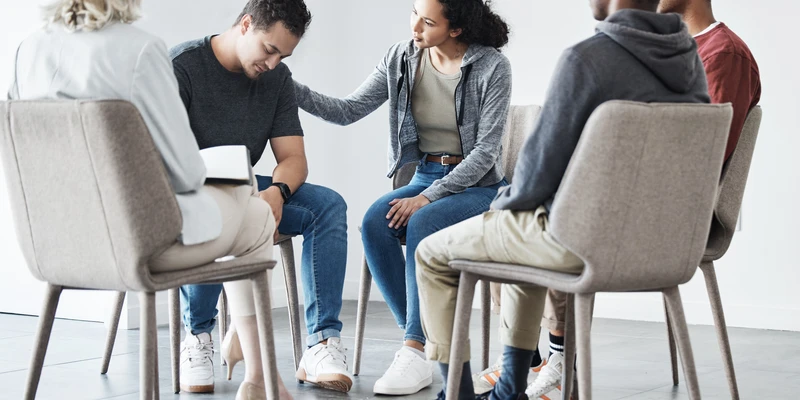If you or someone you care about is struggling with drugs or alcohol, you might be wondering what kind of support actually works. Group therapy for substance abuse gives you a place to share experiences and pick up strategies from people who really understand what you’re going through. 
How Does Group Therapy Work?
Group therapy for substance abuse is a form of group psychotherapy where you meet regularly with others experiencing similar challenges. The main goal is to support recovery through open discussion and shared stories. In this form of treatment, the healing comes not only from the therapist but also from the group members themselves.
Sessions often highlight trust, honesty, and respect among individuals in the group. These principles lay the foundation for long-term healing.
Core principles include:
- Peer Support: Encouragement from seeing others make progress in recovery.
- Accountability: Sharing your journey helps you stay on track and prevents setbacks.
- Skill Building: Developing coping strategies and healthier ways to handle stress or cravings together.
Discussion topics might include managing emotions, navigating relationships, and avoiding relapse triggers. The sense of belonging reduces isolation and builds hope.
Difference Between Group and Individual Therapy
In one-on-one sessions, you have complete privacy and a treatment plan built entirely around your unique needs. This kind of individual treatment gives you space to look deeply into personal experiences.
In a group treatment, though, you’re surrounded by others who are also navigating recovery. Hearing their real stories offers perspectives and lessons you’d never get alone. You’ll notice how group therapy can help participants feel less isolated and more accountable, while individual therapy allows you to focus on personal goals.
Another benefit of the group and individual therapy combination is balance. The group format encourages social skill-building, empathy, and accountability, while private sessions let you work through more sensitive issues.
Many recovery programs use group and individual approaches together because this treatment approach often leads to stronger outcomes.
Benefits of Group Therapy in Substance Abuse Treatment
Group therapy is a core part of a substance abuse treatment program. It’s where you can build a support network and work on communication skills for the long haul.

Building Peer Support Networks
In group therapy, you’re surrounded by others facing similar challenges. This shared experience creates a strong sense of trust and safety among group members.
These support groups don’t just provide emotional comfort. They also give you real strategies for navigating cravings, triggers, and day-to-day stress.
By sharing successes and setbacks, group members learn that recovery is possible and sustainable. Over time, these peer bonds grow into a network you can lean on when things get tough. Having people within the group believe in you can make it easier to believe in yourself, too.
Reducing Stigma through Shared Experiences
Addiction can carry heavy feelings of shame and isolation. In a group therapy session, you see that others share similar struggles, and that knowledge eases guilt. Hearing different types of group stories shows you’re not alone.
When members of the group validate your experiences, the stigma starts to lift. Being able to talk openly in a group therapy for addiction setting helps rebuild confidence and encourages people to seek further care. This is one of the greatest benefits of group recovery spaces.
Enhancement of Communication and Coping Skills
Group therapy helps give you a safe place to build communication and coping skills. You’ll practice listening, sharing your own perspective, and receiving constructive feedback. Therapists often lead exercises that strengthen problem-solving and role-play real-life situations.
Practicing these skills with participants in the group makes you more prepared for stressful challenges outside the room. Over time, the group model and treatment setting teach new ways of handling stress and cravings.
Evidence of Effectiveness
Research supports what many people in recovery already know: group therapies can make a real difference. For instance, a pilot study tested a group CBT program for people struggling with both substance use disorder and depression.
The intervention proved both feasible and acceptable, reducing depressive symptoms and substance use. These findings highlight the promise of integrated models in co-occurring disorders.
Types of Group Therapy for Substance Abuse
Group therapies come in many forms, each tailored to meet different needs. The goal is the same: to help people with substance use disorder strengthen recovery skills, understand behaviour patterns, and feel supported.
Cognitive-Behavioural Groups
Cognitive behavioural therapy (CBT) is one of the most recognized methods used in substance abuse treatment. In these groups, you’ll learn to identify thought patterns that fuel cravings or risky decisions. This helps you gain healthier ways to cope.
These sessions often include role-play, guided discussion, and feedback from both the therapist and group members. This group model helps break down negative beliefs and replace them with tools for resilience. It’s also often applied in treatment plans for relapse prevention.
Skill Development Groups
Skill development groups focus on everyday abilities that support recovery. In this development group, you practice communication, decision-making, and stress management alongside peers. The feedback you get from individuals in the group helps you build confidence in real-world scenarios.
This approach strengthens life skills, which is why it’s considered an important treatment approach for people working through addiction. For many, it’s the most practical therapy for substance recovery.

Relapse Prevention Groups
A relapse prevention group helps you spot early warning signs and protect sobriety. Sessions walk through high-risk situations, personal triggers, and coping methods. Facilitators often encourage a group discussion where people share strategies that have worked for them.
This group therapy may include mindfulness, relaxation techniques, and accountability check-ins. These tools keep recovery on track and are often part of an ongoing treatment program for addiction.
Support and Psychoeducational Groups
Support and psychoeducational groups mix peer support with education about addiction and recovery. You’ll get information on how addiction affects the brain, healthy habits, and resources for managing stress or mental health.
Group members share stories, which helps you feel less isolated. Facilitators use handouts, videos, and discussion to explain key topics.
These groups are a safe place to ask questions, get encouragement, and build a network of people who understand. Topics might include stages of recovery, understanding cravings, and rebuilding relationships.
The Structure of Group Therapy Sessions
A standard group therapy session usually meets weekly and runs 60 to 90 minutes. Sessions start with a check-in, where everyone shares how they’re feeling or what they’re struggling with.
After check-in, the facilitator introduces the day’s theme—perhaps relapse prevention, managing emotions, or building healthier relationships. This leads into role-play, activities, or group discussion where experiences are shared openly.
The session closes with reflections and feedback from participants in the group, reinforcing accountability and encouragement. Having a predictable format helps people feel more comfortable participating.
Group Therapy for Substance Abuse at Sierra Recovery
Recovery doesn’t have to feel like an uphill battle you’re climbing on your own. At Sierra Recovery, our group therapy for substance abuse creates a space where people can breathe again, share openly, and draw strength from the honesty of others.
In these therapy sessions, group members practise new skills, celebrate small wins, and carry one another through setbacks. Each session shows that healing is possible, even after the hardest days.
If you’ve been searching for a place where compassion and practical tools meet, reach out to us to learn more.
Frequently Asked Questions
What are the core components of group therapy for those dealing with addiction?
Group therapy for addiction usually means open talks, sharing what you've been through, and learning ways to avoid relapse. There's a strong focus on building coping skills and holding each other accountable.
How does group therapy support recovery from substance dependency?
You get support from others who know what you're dealing with, which can make the journey feel less isolating. Group therapy gives you a shot at learning new ways to handle cravings and tough situations.
What can individuals expect during their first group therapy session for addiction treatment?
At your first session, you might be asked to introduce yourself, but only as much as you're comfortable. The facilitator will probably go over group rules and talk about confidentiality. You'll listen to others' stories, and over time, you'll start to feel a little more connected to the group.
How often are group therapy sessions for substance misuse typically held?
Most groups meet once or twice a week, but it really depends on your needs and the program. Some intensive setups might meet more often, while others are a bit more relaxed.
How does confidentiality work within the context of group therapy for substance-related issues?
Confidentiality is introduced at the start of every therapy group and is essential for trust. Members agree not to share what is discussed outside the session. Therapists uphold professional privacy standards but may disclose information in rare cases, such as when safety risks are present.
Can group therapy address co-occurring mental health and substance challenges?
Yes. Many treatment programs integrate group work that addresses both mental health and substance issues, offering strategies for managing depression, anxiety, or trauma alongside addiction recovery.






